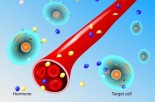Hormones are not just about sex or the beginning and ending to a woman’s period. They play a huge role in your overall health.
Magdalena Wszelaki, founder of the Hormones Balance program, shares her personal story about how hormone imbalance made her incredibly sick and also how you can keep your hormones in check and balanced to keep from suffering the same fate.
Transcription:
RadioMD Presents: Wellness for Life Radio | Original Air Date: April 3, 2015
Host: Susanne Bennett, DC
Guest: Magdalena Wszelaki
This is it. The ultimate wellness show just for you. Wellness For Life Radio with Dr. Susanne Bennett.
DR. SUSANNE: Ever wonder how much of a part your hormones and endocrine system plays in your mood--in your mood and health of you as well as your partners? Right? Your partner's well-being. Now, hormones are not just about how it revs up your sex life or how it's responsible for your PMS (premenstrual symptoms). They actually play a huge role in how we function day to day.
My next guest is dedicated to helping women rebalance their hormones with nutritional and lifestyle changes. She is here to share a personal story and to guide you on how to keep your hormones in check and balance.
Welcome to the show founder of the Hormones Balance Program, Magdalena Wszelaki.
Hello, Magdalena! Welcome.
MAGDALENA: Hi. Thank you so much for having me. It's so exciting to be here.
DR. SUSANNE: I'm so happy you're here, too, Magdalena.
Now, let's get down to the basics. Please tell the listeners exactly which hormones in a woman's body do we really want to focus on?
MAGDALENA: You know, it's a great question. At the same time, you know, I like to think of the hormones like a big orchestra and everything has to like play right. It really depends on the person. I think that, you know, I see a lot in my practice and you probably see that, too. Women having thyroid problems and pooped out adrenals. Those are the biggest two issues that are going on right now. Thyroid--you know your thyroid is out of whack when you start putting on weight and no matter what you do, you just can't lose weight. Then, you have things like you start losing hair, your hair starts getting really dry, skin getting really dry. I know you've talked a lot about skin just recently. You know, you're talking about getting really fatigued no matter what you do. Losing a sense of enthusiasm for life. So, those are typical thyroid stuff. Feeling very cold. That's just thyroid really speaking. Unfortunately, a very much underdiagnosed condition in this country because of very old lab ranges that we are using and incomplete testing for thyroid that most doctors, unfortunately, do.
But, you know, the second thing that I see, it's just our society really calling for that mentality of go, go, go. It's a wonderful thing that us women, we have entered the work force and we are as ambitious as man and we've got all that freedom of doing amazing things, but I think it comes at a price sometimes, too. I do see a lot of women just suffering from adrenal exhaustion. And, here we're talking about, you know, if you're experiencing things that you just can't go to sleep at night. You're feeling wired and tired. You're feeling very light-headed when you get off the sofa. You're craving salty food or sweet food, those are some of the main symptoms of adrenal exhaustion. Yes. I see a lot of that.
DR. SUSANNE: Absolutely. I mean, there's no doubt in modern times, not only just from the fact that we're going and going and having difficulty handling the stresses and having this exhaustion issues. We're also inundated with toxins in the air, what we eat and the chemicals. These chemicals, everyone, they block the receptor sites. They block the receptor sites regarding your thyroid and your adrenals and the receptors in our brain so that all this communication between the body to the brain and the brain to the body gets all mixed up. You know, when it comes to thyroid and adrenal, I know that you've got a really great story. I'd love for you to share and talk about what was your journey in figuring out your hormone issues and now you are helping thousands and thousands of women all around the world who suffer from the same problem. Can you share a little bit about your story?
DR SUSANNE: Yes. I'll make it really short because it is a long story and one of the things, definitely, I have to say is that my story has always been very complex. You know, there are some women who just get all the clues in and resign from their jobs and get good quality sleep and they bounce back pretty quickly. Mine has just been so complicated for such a long time. In some ways, I'm grateful for that because then I think that's where the opportunity comes for anybody to kind of reframe our own problems and health challenges to really ask what can I learn from this? So, in a sense for me, it really all started, or, we tell the story from the time of diagnoses which was Grave's disease many years ago, probably about 20 years ago, which is an autoimmune condition which attacks the thyroid causing the thyroid to be hyperactive. It's no fun to feel this way because it just feels…Imagine. It's like driving a car with somebody pressing on your speed pedal and with you having no brakes. That's just how your body feels. Then, 10 years later, you know, I bounced back and instead of having Grave's, I then developed Hashimoto's Disease, which is an autoimmune disease that many women are suffering from, knowingly or unknowingly, that causes hypothyroidism. So this time, you go to the other side of the spectrum of feeling really exhausted because now your thyroid is underperforming, feeling exhausted, start losing hair and that was my story. The only thing I did not have was that I did not have weight gain because that's just not my thing, but a lot of women, obviously, suffer from that.
You know, and I like to always talk about the time from Grave's and Hashimoto's and then having adrenal exhaustion because I did work in advertising for most of my life and, you know, and I grew up in Asia and so I worked in Hong Kong and Shanghai and Singapore and, you know, it was a phenomenal life. I worked on Fortune 100 brands which are, you know, some of them are like Koenig - brands you can work on. But, that also came at a cost of working 12-14 hours, being on a plane a lot of the time. I was doing strategic planning and I was really good at it. The problem was that everybody wanted your time. You know what it is like to be good at something and everybody wants your time, right? That came at a price and that price was called adrenal exhaustion which I had no idea that I had. All I knew was that I would come home at 8:00 and by 10:00 pm, I'd be so wound up that I'd put on running shoes and go running in Shanghai for like a 10K run—a 7 mile run. Then, I would come home and would have to do a hot bath in order to calm myself down. That's how wound up I was. Then, you sleep not really deep enough and then you wake up tired. Then, you've got to 2 cups of coffee to really bring you back up again so you can function and really absorb what's going on. You know, my turning point was just a sense of fatigue, resignation, real mood swings and really feeling I was not recognizing myself any more. That was my point where I realized, you know, something is not right. I was diagnosed with Hashimoto's. Interesting, my TSH, T3, T4 numbers were all perfect, it's just my antibodies were in the thousands. Because of that, I was never put on any medication and I had to figure it out myself—how to bring those antibodies down. That is what has led me to, giving up my job, going to nutrition school, setting up my own practice and that's what I've dedicated pretty much my life to. I started off with Hashimoto's as the practice and then I extended it to all hormonal conditions. One more thing I want to add on is that, like I mentioned at the beginning. All hormones are like this beautiful orchestra and they really have to work together. What I didn't realize is that I thought I was really good. My antibodies came down. I started feeling amazing. You know, my adrenal exhaustion was…I managed to get my cortisol to a really beautiful curve. It was no more all over the place. I was not the State II fatigue any more. It was all looking good. I felt really, really good. Then, you know what? Four years ago, I started losing hair and I was like, "What is going on here?" Turns out, Susanne, I was then diagnosed with estrogen dominance, so very thankful for having a great doctor who caught. Having estrogen dominance and heavy metal toxicity which I probably got from living in China for so many years and eating pretty much from off the street all the time. You know, and that's what was causing my hair loss. So, again, embarked on the whole journey of understanding estrogen dominance. You mentioned, very rightly, the toxins that we've surrounded ourselves with, a lot of times unknowingly, whether it's coming from skin care products, the stuff that we inhale, those horrible air fresheners, which is like one of my pet peeves really. The stuff that we inhale in our offices, unfortunately, as well. All of that stuff creates a lot of estrogen and toxicity. I managed to clear that out. It took me about a year and a half to really get rid of that. You know, I have to tell you, I mean, I'm in a place in my life that I feel better, as a 42-year-old woman than I felt when I was 24.
DR. SUSANNE: Right. Right. I mean, we can all learn from your experience that everything, you have to look at it. You've got to look at it as not just your hormones. You've got to look at your lifestyle changes. As Magdalena talked about the sleep, the environment, all the chemicals.
To learn more about how you can take control of your hormones, visit Magdalena's website at DrSusanne.com/hormonesbalance. Or, as always, go to my Wellness for Life Radio show on RadioMD.






